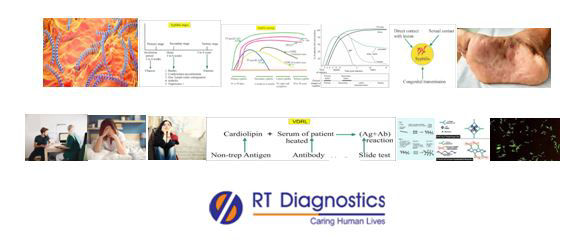TPHA - Test:
Why TPHA – Test?
CLINICAL INFORMATION
Syphilis is a sexually transmitted disease (STD) and hence VDRL (Veneral Disease Research Laboratory) testing is necessary. The bacteria Treponema pallidum causes syphilis. This infection is a highly contagious disease and usually spreads by sexual contact. Initially, it manifests as (primary syphilis) a painless sore (also referred to as ‘Chancre’ manifests as a rash in the trunk region but spreads throughout the body including the palms and soles) in the skin or mucous membranes typically in the mouth, genitals and rectum. It may be self-limiting in many cases and usually remain inactive for decades. When ignored these symptoms develop and manifest further as secondary syphilis, tertiary or late syphilis. When it becomes active (re-activation: secondary syphilis – manifestations are non-itchy wart-like sores in the mouth or around the genital area, muscle ache, fever, sore throat, swollen lymph nodes etc) and in the latent stages (tertiary stages – manifests dissemination with a widespread capacity and shows multi-organ involvement) it manifests with more virulence and impacts many organ/organ system(s) like a heart (swelling of aorta, damage in heart valves etc), eyes, liver, bone, joints, nerves and brain (neurosyphilis – can manifest with seizures) etc and therefore can lead to complications such as blindness, deafness, mental illness, memory loss, stroke, meningitis, neurosyphilis and may also become life-threatening as well. Manifestations of chronic syphilis include saddle nose (nose-bridge collapse) with nasal septal disfigurement, deafness, teeth deformities etc and its symptoms include headache, stroke, meningitis, dementia, loss of pain and temperature sensations, bladder incontinence, sexual dysfunction in men etc. Syphilis can also be transmitted by vertical transmission from pregnant women to the unborn child (congenital syphilis). Subsequently, after the initial screening or confirmatory test for Treponema pallidum is performed a test such as TPHA – Treponemapallidumhemagglutination assay (based on passive hemeagglutination which detects anti-treponemal antibodies –IgG and IgM antibodies in serum and/or CSF). TPHA is also called TPPA - Treponema pallidum particle agglutination assay (it is an indirect agglutination assay used for detection and titration of antibodies against the causative agent of syphilis - Treponema pallidum). TPHA test is a diagnostic test used to detect antibodies in suspected syphilis patients by hemagglutination assay method. The process involves sensitizing the red blood cells (fowl erythrocytes) with Treponema pallidum fragments, and thus when infected patient serum with syphilis has exposed these cells aggregate (clump together) on the surface of the test dish (micro-titer plate). The TPHA positive cases for syphilis are further confirmed by FTA-ABS, RPR (Rapid Plasma Reagin) test for the presence of true infection. The FTA – ABS Test: Fluorescent Treponemal Antibody Absorption Screening Test has grown with widespread acceptance as a standard protocol by which the diagnosis of syphilis is confirmed. The suffix- ABS refers particularly to a processing step that removes non-specific anti-spirochetal antibodies present in the normal serum. If the patient has been infected by syphilis their anti-spirochetal antibodies will bind to the bacteria - Treponema pallidum. FITC (a fluophore)-labelled anti-treponeme antibody and TRITC (another fluophore)-labelled anti-human antibodies are added as secondary antibodies. Thus these infectious pathogenic bacteria are identified using FITC staining and TRITC staining which locates if the suspected patient is infected with the spirochete - Syphilis. This FTA test is 100% approved due to its 100% sensitivity to CSF specimens. False-positive results are associated with other treponemes – eg T pertenue, increased or abnormal globulins, antinuclear antibodies, pregnancy, HSV infections, elevated acute phase reactants, cold agglutinins, Mycoplasma antibodies, age older than 65 etc. Moreover borderline results are inconclusive results and thus cannot be interpreted. Additional/Other tests include serological tests – Non-treponemal tests, treponemal tests, rapid serological tests, Direct Methods for diagnosis, Rapid Immuno-Chromatographic tests, Testing for Neurosyphilis etc. Other tests include Treponema pallidum particle assay, Treponema pallidum immobilization test etc.

General Instructions:
Sample Requirement: Specimen - Blood sample collected from the vein. Test Preparation: None.
NOTE - Sample for specimen collections may vary based on the patient’s condition/cases according to the patient’s presenting complaints / signs or symptoms:
SPECIMEN REQUIREMENT (Special or Rare Cases) - As instructed and guided by Physician / Clinician / Pathologist / as per Laboratory’s requirements, according to procedures and protocols.
This Multi-Specialty Clinical Referral Laboratory RT DIAGNOSTICS provides precise and accurate tests with an extensive range of testing services to the medical centres to help in the diagnosis and identification of pathology in the test specimens for infectious diseases and also to evaluate the function of organ systems of the patient. It prevents further complications and helps to stabilize and restore health to near normalcy at the earliest without delay.



